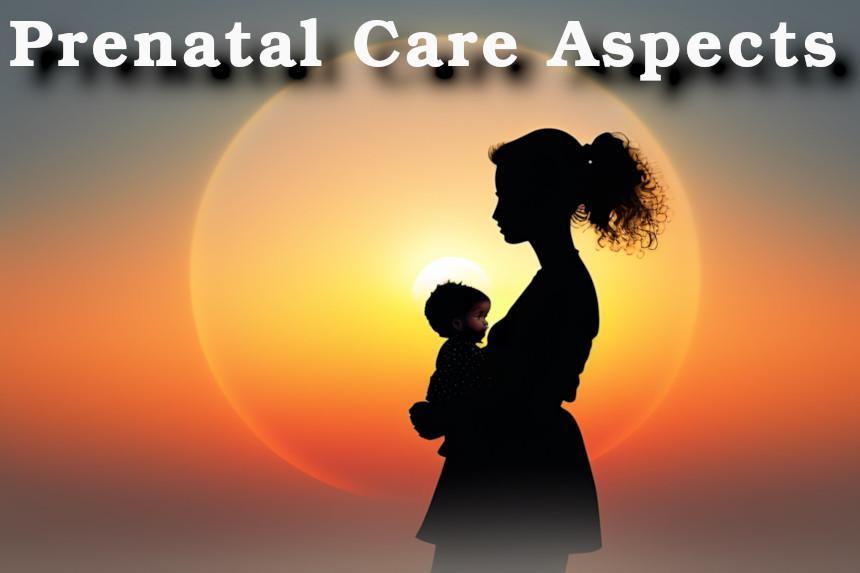


The journey to motherhood is a profound and transformative experience, and prenatal care plays a crucial role in ensuring a healthy pregnancy and the well-being of both mother and baby. In this comprehensive guide, we will explore the essential aspects of prenatal care, offering valuable tips to support expectant mothers on this incredible and joyous journey.
Early and Regular Prenatal Check-ups:
Initiate prenatal care as early as possible. Regular check-ups with an obstetrician or midwife are essential for monitoring the progression of the pregnancy, addressing concerns, and ensuring the health of both mother and baby.
Nutrition for Two:
Proper nutrition is the cornerstone of a healthy pregnancy. Ensure a balanced diet that includes a variety of fruits, vegetables, whole grains, lean proteins, and dairy. Adequate folic acid, iron, and calcium intake are crucial for the developing fetus. Consult with a healthcare professional to tailor your diet to your individual needs.
Hydration and Healthy Habits:
Staying well-hydrated is essential during pregnancy. Aim for at least eight glasses of water daily. Additionally, avoid harmful substances such as alcohol, tobacco, and illicit drugs to safeguard the baby's development.
Exercise and Prenatal Fitness:
Engaging in regular, moderate exercise can benefit both mother and baby. Prenatal yoga, swimming, and walking are excellent choices. Consult with your healthcare provider before starting any new exercise routine, and listen to your body to avoid overexertion.
Educate Yourself:
Take advantage of prenatal classes and educational resources. Understanding the changes your body undergoes during pregnancy, the stages of labor, and postpartum care can empower you to make informed decisions and ease any anxieties.
Supplements and Medications:
Discuss with your healthcare provider the appropriate prenatal vitamins and supplements, such as folic acid and iron. Inform your provider about any medications you are taking to ensure they are safe during pregnancy or to discuss alternative options.
Monitor Weight Gain:
While weight gain is a natural part of pregnancy, it's crucial to monitor it within the recommended range. Excessive weight gain can lead to complications, while inadequate gain may affect the baby's growth. Work with your healthcare provider to establish a healthy weight gain plan.
Emotional Well-being:
Pregnancy is not only a physical journey but an emotional one as well. Attend to your mental health by seeking support from loved ones, joining support groups, or considering counseling if needed. Reducing stress through relaxation techniques can contribute to a positive pregnancy experience.
Prepare for Labor and Birth:
Educate yourself on different birthing options and create a birth plan that aligns with your preferences. Attend prenatal classes that cover labor techniques, pain management options, and postpartum care. Discuss your birth plan with your healthcare provider to ensure alignment with medical recommendations.
Build a Support System:
Surround yourself with a supportive network of family, friends, and healthcare professionals. Having a strong support system can provide emotional and practical assistance throughout the pregnancy and beyond.
Pregnancy and maternity services refer to the medical care and support provided to women during pregnancy, childbirth, and the postpartum period. These services may include:
Prenatal care: This includes regular check-ups with a healthcare provider to monitor the health of the mother and fetus. Prenatal care may include physical exams, blood tests, ultrasounds, and other diagnostic tests to identify any potential health concerns and ensure the health of both the mother and baby.
Childbirth education: Many healthcare providers offer classes or educational resources to help women prepare for childbirth. These classes may cover topics such as labor and delivery, pain management techniques, and breastfeeding.
Labor and delivery services: Healthcare providers may offer a range of options for labor and delivery, including natural childbirth, assisted delivery, or cesarean section (C-section).
Postpartum care: After childbirth, healthcare providers may offer support and monitoring to ensure the mother and baby are healthy and recovering well. This may include physical exams, screenings, and support for breastfeeding and newborn care.
Maternal mental health services: Pregnancy and childbirth can be emotionally challenging, and some women may experience anxiety, depression, or other mental health concerns. Maternal mental health services may include counseling, therapy, or support groups to help women cope with these challenges.
Neonatal care: In some cases, newborns may require specialized medical care due to premature birth, health complications, or other factors. Neonatal care may include monitoring, medical treatments, or surgery to ensure the health and well-being of the newborn.
Pregnancy and maternity services are designed to support women throughout the entire process of pregnancy, childbirth, and the postpartum period. By providing comprehensive medical care and support, healthcare providers can help women achieve healthy pregnancies and deliveries, and ensure the health and well-being of both the mother and baby.
Maternity services can vary greatly from country to country, depending on factors such as healthcare infrastructure, cultural norms, and government policies. Here are some examples of how maternity services may differ in different countries:
United States: In the United States, maternity services are primarily provided by obstetricians and midwives, and women have a range of options for childbirth, including hospital births, birth centers, and home births. However, the cost of maternity care in the US can be very high, and many women do not have access to adequate insurance coverage or paid maternity leave.
United Kingdom: In the UK, maternity services are provided by the National Health Service (NHS), and women have access to a range of free services, including prenatal care, childbirth education, and midwifery services. Most women give birth in hospitals, but there are also options for home births and birth centers.
Sweden: In Sweden, maternity services are highly integrated with social services, and women have access to comprehensive prenatal care, childbirth education, and postpartum support. Midwives play a central role in maternity care, and women have a range of options for childbirth, including hospital births, birth centers, and home births.
Japan: In Japan, maternity services are highly medicalized, and most women give birth in hospitals with obstetricians. Prenatal care is focused on identifying and managing any potential health risks, and women may have limited input into the birth process.
Brazil: In Brazil, maternity care is provided by both public and private healthcare providers, but the quality of care can vary widely depending on socioeconomic status and geographic location. There is a high rate of C-sections in Brazil, and some women may not have access to adequate prenatal care or postpartum support.
Canada: In Canada, maternity services are provided by a mix of public and private healthcare providers, and women have access to free prenatal care, midwifery services, and hospital or home births. The Canadian healthcare system also offers universal healthcare coverage, including maternity care.
Australia: In Australia, maternity care is provided by both public and private healthcare providers, and women have access to free or low-cost prenatal care, midwifery services, and hospital or home births. The Australian healthcare system also offers universal healthcare coverage, including maternity care.
Germany: In Germany, maternity care is primarily provided by midwives, who offer comprehensive prenatal care, childbirth education, and postpartum support. Women also have access to hospital births, birth centers, and home births, and the German healthcare system provides universal coverage for maternity care.
South Africa: In South Africa, maternal and infant mortality rates are high, and many women do not have access to adequate prenatal care or safe childbirth services. However, efforts are being made to improve access to quality maternity care, including midwifery services and hospital-based childbirth.
India: In India, maternity care is provided by both public and private healthcare providers, but there is a significant lack of adequate infrastructure and trained healthcare workers, particularly in rural areas. Maternal and infant mortality rates are high, and efforts are being made to improve access to quality maternity care, including midwifery services and hospital-based childbirth.
The availability and quality of maternity services can have a significant impact on maternal and infant health outcomes. In many countries, efforts are being made to improve access to quality care and support for pregnant and postpartum women, and to reduce disparities in maternal and infant health.
Pregnancy is a complex and multifaceted experience that can involve a range of physical, emotional, and social changes. Here are some aspects of pregnancy and potential solutions:
Prenatal care: Prenatal care is important for monitoring the health of both the mother and the developing fetus. This may include regular check-ups with a healthcare provider, ultrasound exams, and various tests to assess the health of the mother and the baby. Early and regular prenatal care can help detect and manage any potential health issues, and can also provide support for the physical and emotional changes that occur during pregnancy.
Nutrition: Good nutrition is essential for the health of the mother and the developing fetus. This may involve consuming a balanced diet that includes a variety of fruits, vegetables, whole grains, and lean proteins, as well as taking prenatal vitamins and supplements as recommended by a healthcare provider. Maintaining a healthy weight during pregnancy can also help reduce the risk of complications such as gestational diabetes and high blood pressure.
Exercise: Regular exercise can be beneficial for both the mother and the developing fetus, and may help reduce the risk of complications such as preterm birth and gestational diabetes. However, it is important to consult with a healthcare provider before starting or continuing an exercise program during pregnancy and to choose activities that are safe and appropriate for each stage of pregnancy.
Emotional well-being: Pregnancy can be a time of significant emotional and social changes, and may involve feelings of anxiety, stress, and depression. It is important to seek support from a healthcare provider or mental health professional if these feelings become overwhelming or interfere with daily functioning. Other strategies for promoting emotional well-being during pregnancy may include engaging in self-care activities such as mindfulness meditation or relaxation techniques, and seeking support from family and friends.
Complications: Although most pregnancies proceed without significant complications, some women may experience issues such as gestational diabetes, preterm labor, or preeclampsia. In these cases, early detection and management can be critical for promoting the health of both the mother and the developing fetus. Treatment options may include medication, lifestyle modifications, or in some cases, early delivery.
Prenatal care is a holistic approach to nurturing both the physical and emotional well-being of expectant mothers. By prioritizing regular check-ups, proper nutrition, emotional well-being, and education, mothers can embark on a journey that not only ensures a healthy pregnancy but also sets the foundation for a positive start to motherhood. Embrace the transformative process with open arms, supported by the guidance of healthcare professionals and the love of those around you.
Warm regards,

We use cookies
We use cookies and other tracking technologies to improve your browsing experience on our website, to show you personalized content and targeted ads, to analyze our website traffic, and to understand where our visitors are coming from. Privacy Policy.